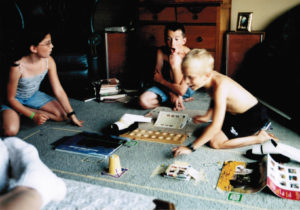
Beat Boredom This Summer With These 4 Tips

Research has shown that being bored is not such a bad thing for kids. Boredom can foster creativity and patience. Yet, when a parent hears that tired phrase, “I’m bored!” again and again, we may feel the need to fix the boredom problem, and keep our kids happy and busy. Does this work? Possibly. But, only if you are trying to fix the problem in the short term. Once the activity or event is over, the familiar whine resurfaces. How do we beat boredom once and for all with kids, while at the same time teach them some important life skills? Read the story below about my interaction with a seven-year-old family friend, and consider these four tips to beat boredom in your own family.
Josie looked at me (the “fun guy” at the table) as she announced with conviction, “I’m bored!”
We were at an outdoor restaurant, and she had finished eating before the rest of us.
My “keep people happy” value kicked in, and right away I felt an urgency to fix her boredom. I immediately started looking for something she could do. There were no crayons at the table, no booklets to page through and no playground near, and there was no way I was going to let her play with my phone. Josie sat impatiently, waiting for me to somehow magically solve her problem. And then it dawned on me.
This was Josie’s problem, not mine.
But I was doing all the brain work to solve it. Realizing that simple fact helped me choose a different course.
“Well, Josie,” I started gently, “What do you want to do about that?” I asked. This question helped Josie understand that this was her problem, not mine. Her answer was predictable.
“Can we go now?”
“No,” I said with a smile, “The rest us need to finish our food. It will take a few minutes. But I’ll bet you can figure out some things to do while you wait.” Josie started to complain, to which I replied, “Well, complaining is one of the things you could choose, but it’s kind of a distraction, and then it may take me to longer to eat. I’ll bet if you think about it, you could figure out some things you’ll like better than complaining, which doesn’t really solve anything.” I looked away from her and kept eating. Josie huffed and then sat quietly.
After a couple minutes, Josie asked if she could leave the table. I asked her where she wanted to go, and she said she just wanted to go over to the fence and look out to the lake beyond the restaurant. I granted permission and asked her to stay in sight. A few minutes later, I finished eating. I called her and asked her to tell me what she saw. She described the scene quite well, even with a bit of excitement, and then we left.
While it’s not always this easy to help kids overcome their boredom, there are some basic principles that guided me that day, and that we’ve seen be helpful for many parents.
1. Change your whole family’s perception of boredom and downtime.
Periods of boredom can have many personal benefits, and can even boost brain function. Research shows that boredom/down time motivates people to pursue more meaningful activities, including serving others. It also increases creativity, and improves memory and deeper thinking as the brain has time to process previous experiences. Discuss these benefits with your kids. Then, when the next complaint comes, you can empathize but remind them, “Being bored can seem frustrating, but a lot of good things can come from it, depending on how you respond.”
2. Resist the urge to take your kids’ boredom on as your problem.
It’s tempting to provide the quick fix – a glitzy activity or a glowing screen that makes kids happy in the short run. But when an adult solves a child’s boredom problem, it sends a message, “You are neither capable, nor responsible to think for yourself.”
3. Help kids by asking questions and stating facts.
Non-judgmental questions and facts help your kids learn you can’t be manipulated, and they are responsible for their own boredom. Examples of this are:
- “Whining or complaining is one of the ways you could handle this.” (said matter-of-factly with a smile, not sarcastically.)
- “You have two hours of free time until we leave. How would you like to use it?”
- “Screen-time isn’t an option now, but I’ll bet you can come up with some other creative ideas.”
- “What might you do with your time that would be a blessing to someone else?”
4. Schedule a family meeting for kids to brainstorm creative non-screen activities.

Once kids come up with some ideas, you can support them by getting any needed supplies. One mom stated she was going to give her kids a weekly arts and crafts budget for the summer. Our family had a “junk box” full of random odds and ends, packing materials, and quirky garage sale items. When kids said they were bored, we reminded them of this box they had helped stock, and they almost always had creative fun with it.
If you feel really stuck, a little structure can increase creativity. You could designate certain themes for days of the week, and then they can come up with the activity: for example the craft idea for “Make it Monday”, a park to explore for “Walk in the Wild Wednesday” or the recipe to make for “Foody Friday.”
God, our Creator, has placed His creativity in all of us. Quick entertainment can easily erode that gift. Instead of being pitted against your children in the boredom war, tackle this challenge together, nurturing your kids’ God-given creativity.
Sign up below to receive a weekly dose of encouragement straight to your inbox:







